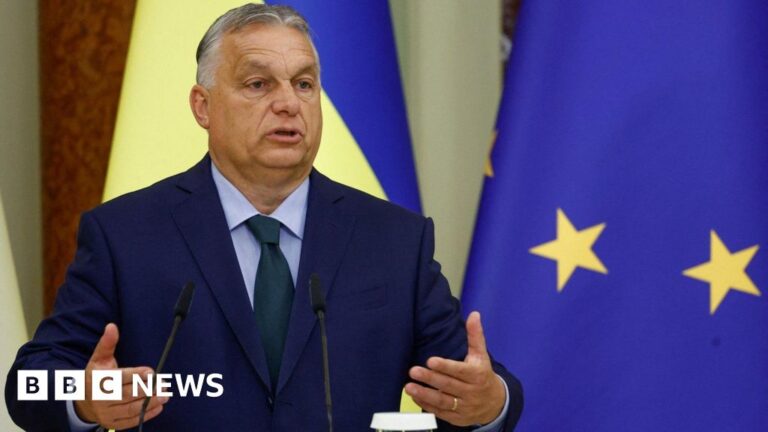Hungarian Prime Minister Viktor Orban has arrived in Moscow to meet with Russian President Vladimir Putin for talks on the war in Ukraine.
The visit was criticised by EU leaders, who stressed that Mr Orban was not acting on behalf of the bloc.
Mr Orban is the only EU national head of government to have retained close ties to the Kremlin after its full-scale invasion of Ukraine in 2022.
He described the trip as a “peace mission” in a message posted on X, which comes days after his visit to kyiv.
On the first leg, he spent three hours with Volodymyr Zelensky in kyiv on Tuesday – both parts of the trip carefully choreographed to showcase Mr Orban as a global statesman, rather than a black sheep.
Like previous moves by the 61-year-old Hungarian leader, the visit to the two capitals is a risky gamble.
In a video of the meeting, Mr Putin said Mr Orban was visiting “not only as a long-standing partner” but as a representative of the European Union.
Hungary has just taken over the presidency of the Council of the European Union, which will run until the end of the year.
Speaking at the meeting, Viktor Orban said: “Hungary will gradually become the last European country that can talk to everyone.”
The Kremlin said Friday that talks between Hungarian Prime Minister Viktor Orban and Russian President Vladimir Putin would last at least two or three hours, but could continue “as long as necessary.”
Officials are accompanying the two leaders during the discussions, but it is possible that they will meet one-on-one.
Some European leaders have openly condemned the Moscow trip. Finnish Prime Minister Petteri Orpo called it “worrying news,” while Polish Prime Minister Donald Tusk tweeted: “The rumors about your visit to Moscow can’t be true, @PM_ViktorOrban, or can they?”
“Appeasement will not stop Putin,” European Commission President Ursula von der Leyen wrote on X.
“Only unity and determination will pave the way for a comprehensive, just and lasting peace in Ukraine.”
In a statement, EU High Representative for Foreign Affairs Josep Borrell said the trip “takes place exclusively in the framework of bilateral relations between Hungary and Russia.”
The Russian president told Mr Orban he would be happy to discuss the “nuances” of his recent Ukraine settlement plan, in which he offered talks if Ukraine withdrew from Russian-occupied regions.
The Kremlin leader has set out a number of strict preconditions for negotiations, but kyiv and its Western allies say these would amount to a capitulation by Ukraine.
Earlier this week, Mr Orban visited kyiv, saying that “a quick ceasefire could be used to speed up peace negotiations”.
Ukrainian President Volodymyr Zelensky, who has frosty relations with Mr Orban, has not responded publicly to the proposal.
Before last summer’s Ukrainian offensive, Orban warned that Ukraine could not win on the battlefield.
Since the start of the full-scale Russian invasion in February 2022, the Hungarian prime minister has stressed that Russia’s advantage in resources and manpower makes Putin’s country unbeatable.
Time seems to be proving him right. In anticipation of the harsh winter of 2024, he expects President Zelensky to be more willing to trade territory for peace.
However, many Ukrainians believe that any ceasefire would only consolidate Russia’s grip on the territory it has captured from Ukraine, and if negotiations were to take place, they would prefer that they be conducted from a position of strength rather than from a defensive position.
Mr Orban has been a vocal critic of Western support for Ukraine. He has previously delayed reaching an agreement on a €50bn ($54bn; £42bn) EU aid package to support Ukraine in its defence against Russia.
Tuesday’s visit to kyiv was his first in 12 years, after he met Mr Putin several times during that time.
During the joint appearance of Mr Orban and Mr Zelensky, the body language between them was not warm and neither took questions from the media after making their statements.
But for the next six months, Mr Orban’s position as head of the Council of the European Union means he will play an influential role as Europe’s figurehead.
He came to Ukraine on the second day of his term for talks, saying it was necessary to resolve previous disagreements and focus on the future.


